
August 2022
CEO update
It is now just over 2 years since we disrupted our old businesses to create Pinion Advisory. We shared a common vision to build a larger business that positioned us well for the future.
The evolution of Pinion Advisory continues at a very quick pace. Our team have settled well, and we have continued to provide valued client services...
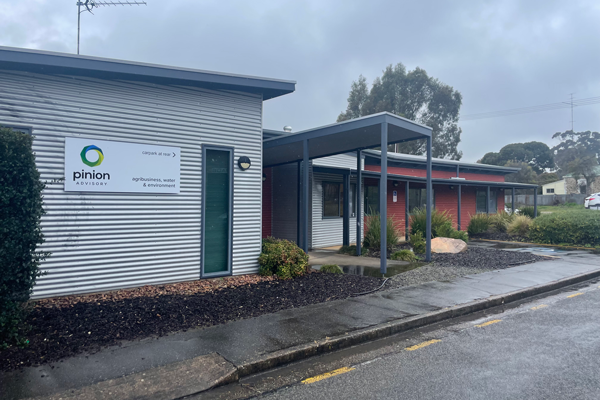
Our business now feels very different. We have moved from reactive to proactive leadership and management. I am excited by this trend because this is where we can start to implement innovation and thinking to create greater value for clients. There are some exciting initiatives in the wind.
Disruption of industries, supply chains and its impact on people is now a common theme in business. Our capacity to manage change needs to be a core skill.
We have seen many clients struggle with managing change, especially in business succession. I am really excited about the recruitment of Bron Stedall as a People Development Consultant. Please see more information about Bron in the article below.
The next stage of the business integration of the HydroPlan team happens on the October 1. This is when they change their shirts and become part of the Pinion Team. This will create a new level of alignment and build our team to over 100 employees who work nationally. Our water and environment teams are working on some awesome projects that will provide lasting benefits and opportunities to clients.
There are all sorts of new business challenges and others that are emerging. It is a reminder that it is critically important to approach all opportunities and challenges with a level head that is supported with data that is scientifically validated. Our farm business team are well positioned to assist with managing change and optimising opportunities.
Our US Partners have also now adopted Pinion as their brand. This means we have taken another step towards building a global agricultural, water and environmental consulting business. Agriculture is increasingly being influenced by global events, so having feet on the ground globally will help provide better quality information and benefit clients.
I hope you enjoy reading the articles in this edition of InTouch.
Introducing Bron Stedall
Stepping into the newly created role of People Development Consultant, I’ve joined Pinion Advisory to complement current services, by offering:
- Confidential coaching to support clients through personal challenges and change. This can be held face-to-face, in person or online.
- Leadership and personal development workshops that equip attendees with insights and strategies to better handle stress, communication, and interpersonal relationships.
- Conflict resolution to facilitate clear communication and mutually beneficial outcomes...
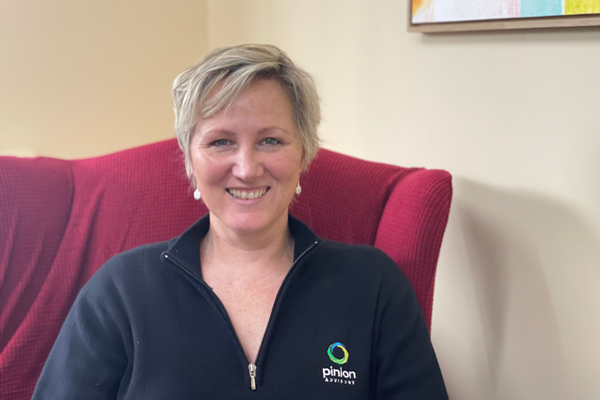
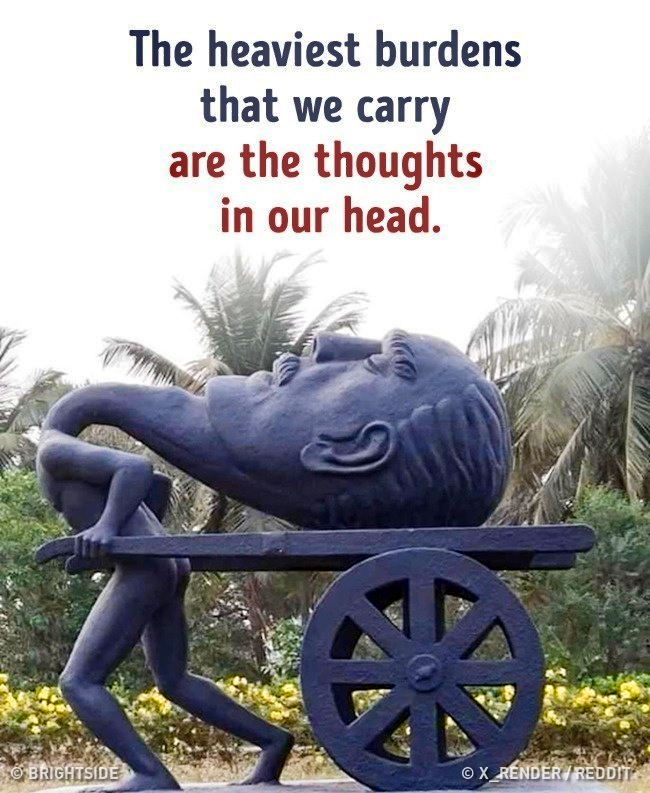
I love helping people analyse their situation and current way of thinking to problem-solve and implement small changes in perspective. This creates big changes in understanding and behaviour. This also helps to handle things in a way that strengthens wellbeing and relationships.
My workshops are also geared towards breaking down human behaviour so that everyone makes a lot more sense. Not only does this increase your emotional intelligence but also helps empower you to control the negative impact that others may have on you.
A key secret to mental health is understanding what story we’re telling ourselves when we’re upset or stressed. Whether we put a positive or negative spin on things, it’s still just a story we make in response to how we’re feeling AND beliefs we have about who we are (strong, kind, loving, independent etc.)… But, did you know that we all tend to do the same 4 things when we mentally process a negative experience?
- We take things personally e.g. feeling disrespected by the person you’re angry with?
- We see things in black and white, so we’re quick to judge others if we perceive any wrongdoing.
- We think our feelings represent the truth of a situation e.g., we think our anger is justified because XYZ made you feel angry.
- We have our well-rehearsed way of making sense of things and creating meaning (story) even though, more often than not, we don’t know the other person's side of things.
So, it really matters how we apply these 4 filters, but these insights are only the beginning. If you’d like to learn more, please get in touch, I’d love to help.
A little about me
I’ve called the Clare Valley home for the past 15 years, where I live with my husband Scotty (aka Angelface) and my two boys aged 15 and 12 years. I tell everyone I’m an Ozzie by heart …. BUT I did support the Springboks against the Wallabies on August 27!! (Call it ‘for old times’ sake!’)
I have been studying coaching through the International Coaching Institute since 2016, psychology (part time) through Macquarie University since 2019 and enrolled in a counselling diploma, through AIPC, in 2021. I am absolutely fascinated about understanding ‘the mind’ and supporting people through challenges, which I’ve been doing since 2018 as principal of Mind Matters Coaching.
My favourite saying is by Robin Sharma, “change is difficult at first, messy in the middle, and glorious in the end.”
Thanks for reading and I hope our paths cross one day.
To contact Bron, please call 0492 269 752 or email.

New name. New logo. Same mission.
Don't forget - as of October 1, HydroPlan will be trading as Pinion Advisory.
Farm biosecurity
With the recent Foot and Mouth Disease outbreak in Indonesia, biosecurity has been in the news a lot. There are simple and practical steps producers, workers, contractors, consultants and other farm visitors can take to help protect our valuable agricultural industries from the risk of unwanted diseases and pests making their way onto properties.
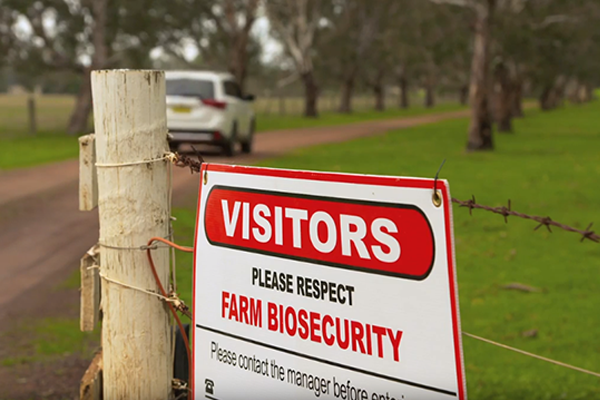
A good place to start, when it comes to farm biosecurity, is developing a biosecurity plan (if you already have a plan, consider reviewing and updating it if you have not done so recently). Your biosecurity plan can help you determine what reasonable measures you can implement across your farm - from how you mitigate the biosecurity risk from visitors and incoming livestock, feed, seed or machinery, how you manage feral animals and weeds, and even helping reduce potential biosecurity risks from your usual production practices and from the outputs leaving the farm. It is also a great resource to have when you are inducting new staff or visitors onto the farm to help demonstrate your expectations and biosecurity procedures.
Keeping good records for farm activities, such as visitor registers, livestock and plant material movements, spray or chemical treatments, vaccinations and crop pest surveillance, just to name a few, are extremely valuable to have on hand. These records will be crucial in the case of disease outbreaks, for example, where they can be used to quickly identify where things have been moved to and from, and to pinpoint where diseases have emerged and spread to. They can also help you keep on top of disease, weed and pest management, in terms of staying up to date with any treatments and vaccinations.
A critical point on your property is the farm gate. Managing biosecurity risks before they get to the property is a great way to help you protect your farm. Limit how many boundary gates can be opened or accessed and, for those that visitors enter through, place a farm biosecurity sign on the gate asking visitors to call ahead before entering the property. This way you can let them know what your expectations are for biosecurity if they enter your property – such as parking in a particular spot, signing a visitor register, or using any foot baths, handwashing facilities or vehicle wash down areas.
Some measures will be more practical for your farm business, so try and implement what works best for you that still reduces the biosecurity risk to the best of your ability. For example, wash down bays are a great way of being able to ensure vehicles and machinery are clean before and after they are used on the farm, however, this measure may not be possible for everyone to set-up and initiate. Consider other measures that may be more practical for you to implement but are still effective, such as asking visitors to ensure their vehicles are washed and clean before arriving, allocating designated parking areas for visitors away from production areas, asking visitors to use your farm vehicles or machinery when they are on the property, or requesting visitors meet you at the farm gate and not enter with their vehicles.
Having biosecurity measures in place is like an insurance policy for your farm – by preventing the risk as best as you can before it is a problem, you can reduce the possibility of disaster striking down the track! For more information on biosecurity measures, jump on the Farm Biosecurity website to view a range of tools and templates for biosecurity planning and record keeping across numerous industries.
Commodity principles to navigate volatile markets
Since the Russian and Ukraine conflict began back in February, the grain markets have seen volatility not witnessed in our lifetime. This coming off the back off the Covid-19 pandemic has created an ongoing headache in the marketing world. We have seen record breaking local cash pricing as well as new record highs in the futures markets with limit up and limit down movements in many trading sessions. Navigating grain marketing can be a challenge at the best of times, however there are ways to approach marketing your grain in these volatile times.
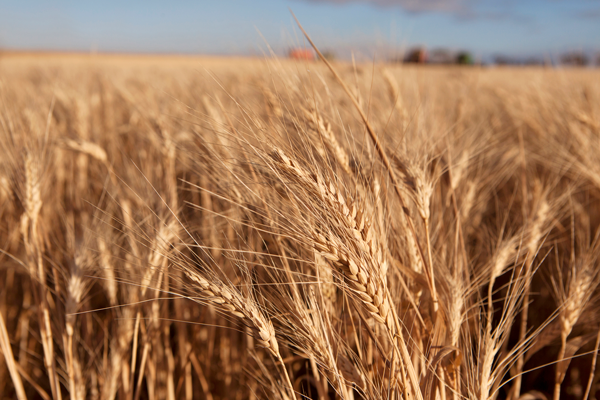
Let’s starting with looking at cost of production. We know cost of production has increased with fertiliser, chemical and fuel cost all rising this season. Typically, we are seeing a 40% cost increase this year. Knowing your cost to produce a tonne of grain is a key starting point to establish a baseline of what a profitable target may be for you. Knowing what you have spent and what you are likely to spend in the coming months will allow you to calculate your cost of production. With these costs in mind, we also need to look at production estimates to work back to a cost per tonne to produce. We are still a fair way from harvest with production risk at the front of many minds with the recent spell in dry weather. Be realistic on estimating yields to leave some room to move later in the season.
This leads on to knowing when a good price is a good price. Now that you know your cost of production, looking at forward sales and cash sales throughout harvest can help decision making on when to sell. Previous years we would look at the decile report as a tool to help make the decision on selling. With current wheat/barley/canola pricing all sitting well above the decile 9 range another approach is needed in aiding the decision to sell. Looking at a price that is profitable for your business is key. Even if you have missed the ‘peak’, current numbers are still excellent in value. Look at smaller tonnage sales to average up your position if required. Locking in high prices early on certainly has its positives, such as locking in a good price before harvest pressure hits pricing and having pre-sales done to cover cash flow throughout harvest. This may also be beneficial for the bank to see if lending is required prior to harvest.
Setting your business grain marketing guidelines is another way to aid the decision-making progress. This means sitting down and working what would be best for your business as a strategic approach to profitability and managing volatility. This is done by setting sales targets at various stages of production with pricing based on certain criteria. An example of this may be 0.2t/ha forward sold by seeding with a price above a decile 9 number. Being pragmatic on forward sales and production predictions are key as there is risk involved with forward sales contracts driven by production risk.
Overall look at what works for you and your business. Look at what will make you profitable. Once decisions have been made and executed, move on to the next decision, rather than dwelling on it.
Please call the grain marketing team, on 1300 746 466, if you wish to discuss your grain marketing any further.
Collaboration on recycled water in the Barossa
HydroPlan and Pinion Advisory officially joined forces on 1 January 2022. Behind the scenes the two businesses have been collaborating on a range of client focussed projects showcasing the combined strengths of the merged business.
Demonstrating this, our teams recently combined to deliver a project for the Barossa Council to plan for an expansion of a recycled water irrigation scheme at Stockwell. This scheme currently supplies recycled water to a local vineyard but, with a desire to reduce reliance on groundwater supplies, Council had identified the potential to extend the scheme to the nearby Stockwell sportsground.
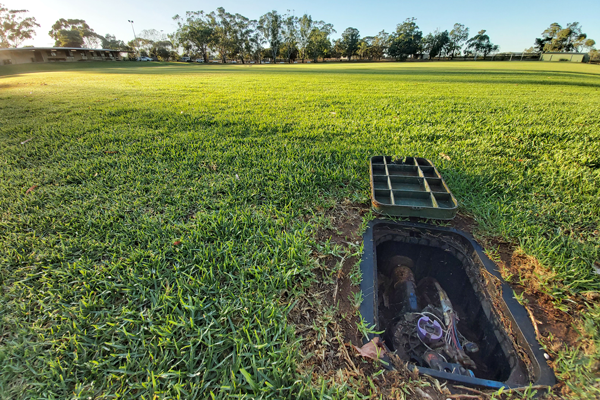
The scope of the project included a detailed irrigation review, core business for HydroPlan, and also assessment of soils, estimates on recycled water nutrient application and recycled water risk management – core business for Pinion Advisory’s environmental sustainability team.
HydroPlan staff, led on this project by Principal Consultant James Sullivan, were able to quickly coordinate a site visit from Launceston based Pinion Advisory senior consultant Ryan Francis. Ryan, an environmental scientist, visited the site within a week of the request to assess soil test pits and determine suitable control measures for managing recycled water irrigation on the site. James and the team concurrently undertook an irrigation audit and prepared a report to support Council’s business case for upgrading infrastructure at the site.
The merger of HydroPlan’s irrigation design skills with the broader capabilities of Pinion Advisory allows us to deliver the full scope of recycled water projects in-house - from idea and design, through to environmental approvals and ongoing monitoring. Our clients can enjoy the benefits and efficiencies of using a single partner to see their ideas come to fruition.
To discuss the broad services the new merged entity can offer your organisation visit our website at or HydroPlan or phone us on 1300 746 466.
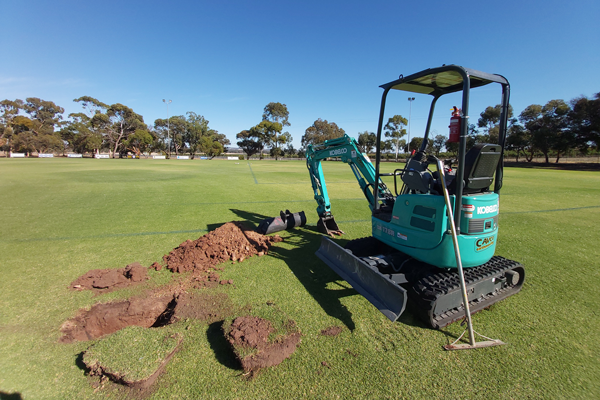
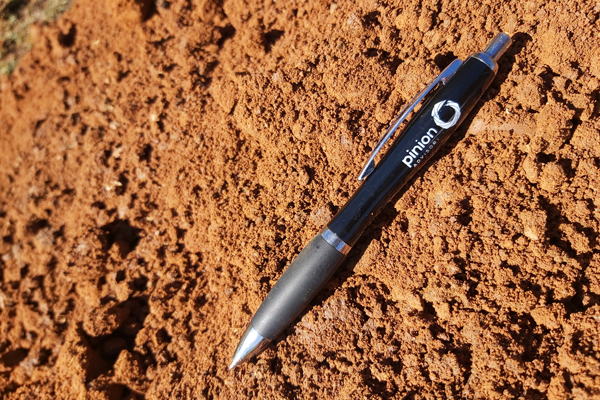
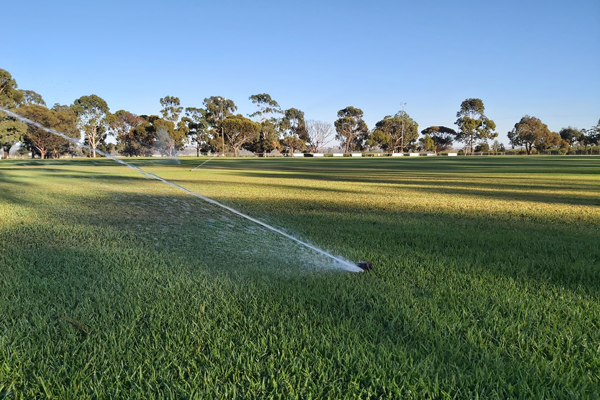
Next Gen Breakthrough Group
Are you on farm, working towards succession and looking to set your direction for the future?
Kicking off in February 2023, Next Gen Breakthrough is a 3 year program developed to foster the next generation of farm managers.
Watch the short video with previous participants, Branden and Ian, who have completed the program.
Carbon farming - where is the starting line?
There has been a lot of interest in the carbon services offered by the Pinion Advisory Carbon Team. Increasing public awareness and a pull from processors and consumers towards carbon neutral products, is driving demand in this area. “Farmers are curious about the carbon space and looking to understand the opportunities and, importantly the risks”, says Sarah Barrett senior carbon and climate change consultant.
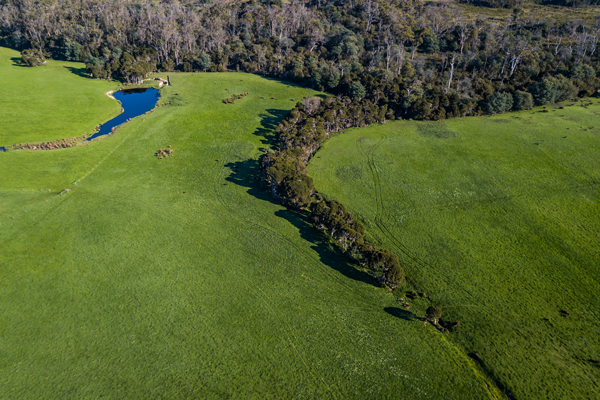
A common question Sarah hears is, “where do I start?”. The most important starting point is to know where you sit in terms of emissions. Most producers have a limited understanding of where their business sits in terms of carbon emissions and how straightforward or difficult it may be to reach carbon neutrality. Knowing where you currently sit provides a robust starting point.
Simon Ifould from Maratala pastoral in SE South Australia, took this approach. Simon wanted to understand where their farming business stood and that it “made sense to start to investigate the realms of carbon farming”. He says it wasn’t necessarily about being carbon neutral or undertaking carbon farming but “understanding how it all fits.”
The carbon team at Pinion Advisory highlight that producers should be cautious and seek independent advice before entering the carbon trading space. While there may be opportunities for some, it won’t be the case for everyone. Launching into the carbon trading market may present issues for producers who want to establish carbon neutrality in the long run.
There is also a growing trend among primary producers to get carbon ready, not necessarily with a view to selling carbon credits, but to use their carbon credentials in the marketplace. With industry targets such as MLA’s carbon neutral 2030, producers are realising that getting carbon savvy signals to the marketplace their commitment, and potentially a competitive advantage.
Pinion Advisory are working with clients to take investigation of carbon opportunities a step further, incorporating financial analysis to review potential of carbon farming, vegetation sequestration and emission reduction projects, in line with business goals. Understanding not only the up front, but also the ongoing costs to set up such projects, as well as the potential returns, provides confidence for producers to make informed decisions, relevant to their individual situations.
Accessing current and relevant information can be challenging with technology changes, research updates and conflicting messages. As such, Pinion Advisory are holding a series of Carbon 101 webinars for internal Pinion clients throughout October. To register your interest for these free webinars click here.
For more information on carbon farming and Pinion Advisory carbon services contact 1300 746 466 or refer to our Carbon Services Factsheet.
Environmental Sustainability Team
After nearly two years of Covid restrictions hampering travel, the Pinion Advisory Environmental Sustainability team finally came together face to face for the first time in May 2022. Over 25 environmental, sustainability and water management consultants came from across southern Australia to meet up in Hobart, Tasmania, for a few days of team building, learning from each other and field trip fun.
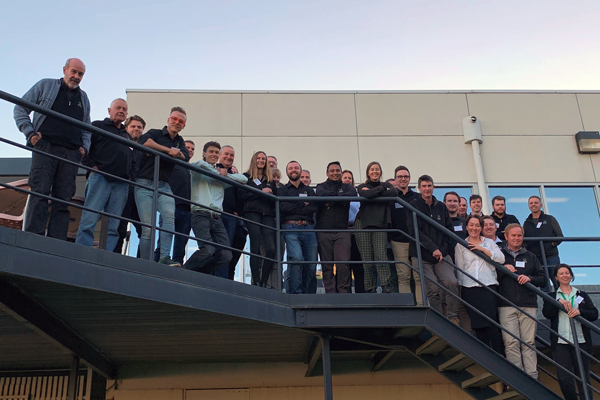
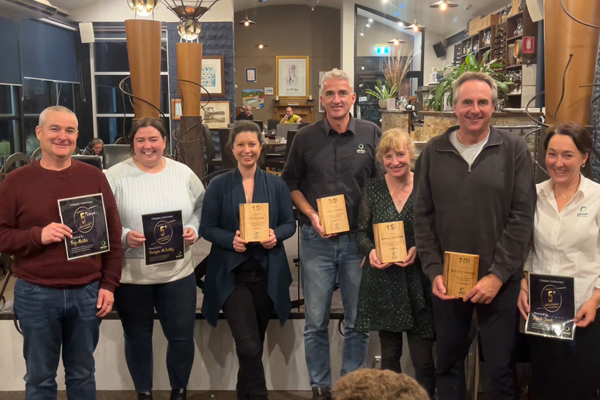
We also celebrated service awards for members of our team, with some people racking up 5, 10, 15 and 30 years of service to the company (and its predecessor companies). Working on our team, our skills, connections and relationships helps us to continually improve our services and offerings for our clients and keep us energised and excited about the opportunities ahead.
During our time together, we had some fascinating afternoons out in the Tasmanian countryside looking at the results of Pinion Advisory’s consulting services over the years.
We visited a commercial composting facility to the northwest of Hobart, which takes organic wastes from industrial enterprises in southern Tasmania and also utilises biosolids from TasWater’s municipal sewage treatment plants around Hobart as a soil conditioner on the surrounding farmland. Pinion Advisory consultants Hilton Henning and Jason Lynch talked about the environmental compliance requirements of the operation, how it fits with the commercial farm business and hopped in a few soil pits to show what organic matter inputs can do for soil health and pasture productivity.
The team also visited key water infrastructure sites in the Coal Valley in southeast Tasmania, where Pinion staff have previously or still do play a role in the development and/or operations. Starting at the Craigbourne Dam (a 13,000ML, rolled concrete dam wall storage built in 1985), which Pinion partner and Principal Consultant, Chris Thompson, was involved in overseeing the building of, earlier in his career, when he worked at Tasmania’s Rivers and Water Supply Commission. Another stop along the way included looking at Tasmanian Irrigation’s Southeast Irrigation Scheme, which has involved several of the Pinion team have been involved in aspects of engineering design, operational management and environmental reporting. The afternoon wrapped up at a vineyard in Richmond, which utilises irrigation water from the Southeast Irrigation Scheme and TasWater’s Clarence Recycled Water Scheme. Pinion staff have been involved in the operational management and environmental monitoring of the recycled water scheme since it commenced operation in 2006, and worked closely with the farmers in the region to ensure good production and environmental outcomes.
Pinion Advisory uniform policy goes green!
Pinion Advisory has recently updated its uniform policy with a stronger emphasis on environmental sustainability and supporting Australian fibre and manufacturing businesses. Working with textiles sustainability consultant, Laura Gransbury, Pinion Advisory has introduced a number of new initiatives.

Working with textiles sustainability consultant, Laura Gransbury, Pinion Advisory has introduced a number of new initiatives, including:
- A sustainability star rating for each uniform item to enable staff (and the company) to make informed choices about uniform items in relation to environmental sustainability.
- A repairs policy, supporting staff to have uniform items mended and extend their life.
- Inclusion of more cotton, wool and recycled textiles in our uniform suite.
- Where possible, a preference to purchase from Australian owned companies and Australian grown fibres.
- Continue to offer a second-hand uniform pool for items still in good condition, but no longer required by the original owner – to ensure we are getting maximum life out of all uniform items.
- Continue to recycle old uniform items once they have reached the end of their usable life.
Mel Rae at Pinion Advisory, says “this is a really positive outcome for Pinion Advisory as a company, its employees and the environment. Feedback from staff was that they wanted to be able to make informed choices about the uniform items they choose to wear and this enables them to do so.”
“Working with our advisor, Laura Gransbury, we have been able to confidently develop a policy which reflects best practice – and as best practice changes over time and new products become available in the marketplace, we’ll be able to continually review and improve.”
If you are also interested in understanding more about the sustainability of the clothes you wear to work, we recommend engaging Laura Gransbury (LinkedIn).
